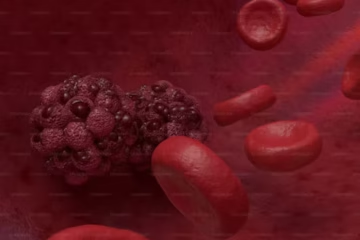Nine Warning Signs of Lymphoma
Never assume that you have this kind of cancer based on symptoms since the signs are often nonspecific and vague.
At least in the early stages, many cancer forms do not have any symptoms. If the patient has low-grade (slow-growing) lymphoma, such is often the case.

However, problems can sometimes arise from even low-grade lymphoma. After a few years, lymphoma may turn into a more aggressive form of cancer. One The chances of symptoms becoming noticeable or painful increase greatly at that point.
What Are the Symptoms of Lymphoma?
Not everyone has the same problems because lymphoma symptoms can differ from person to person. In addition, most of the symptoms that are associated with lymphoma are vague or caused by other diseases as well, so you should not assume that experiencing one of them means you have the disease.4 However, it would be prudent to be familiar with the following possible lymphoma symptoms and report them to a healthcare professional if you experience any of them
Swollen Nodes of Lymph
The lymphocytes are the major target of lymphoma. White blood cells known as lymphocytes are produced in your lymph nodes and bone marrow.
Lymph nodes in the neck, groin, and armpit are the most common locations for your lymphocytes. Your spleen, which is behind your left rib cage, also contains many lymphocytes.
More white blood cells are attracted to your lymph nodes to help fight the infection.6. Felipe Samaniego, MD, a board-certified internist and medical oncologist at the University of Texas MD Anderson Cancer Center, told Health that when you get a cold, for example, you may find that they swell up and become tender.
However, since lymph nodes are full of many malignant cells, they can swell in lymphoma patients. For the same reason, your spleen may be swollen.
In general, swelling of lymph nodes due to lymphoma is less painful than in the case of infection. However, some cancer patients complain of pain.
Gary Schiller
MD, clinical investigator in acute and chronic leukemias, multiple myeloma, and other hematologic malignancies at the University of California in Los Angeles, said Health, “Fever is a sign that your body’s immune system is activating.”. Either your body is fighting off an infection, or cancerous cells, such as lymphoma, can cause that reaction.8 If you are experiencing fevers for no apparent reason, let your healthcare provider know so they can look into it and identify the underlying cause..
Sweats at night
There are a few causes of waking up dripping with sweat and some autoimmune disorders or hormone fluctuations when reaching menopause. In any case, though, night sweats occur with some patients afflicted with lymphoma.
Well, no one is entirely sure just what triggers night sweats, but in reality, anything can produce them. Possibly, this reaction of night sweats comes from how your body perceives the by-products from the lymphoma cells.
This symptom further raises the possibility that you may not be able to control your body temperature or have nighttime fever spikes.
Lymphoma can also manifest by lack of appetite; sometimes nausea and vomiting or abdominal pain. Due to the fact that the abdomen is one of the main places where lymphoma grows, in the form of lymph nodes, the development may cause symptoms associated with this part of the body. They include: 9 Nausea Pain Vomiting Loss of appetite
Reduced Appetite
Another symptom of lymphoma may be a lack of appetite or feeling full too quickly. Some patients also experience nausea, vomiting, or stomach pain.
Your liver or spleen’s lymphatic tissue or the lymph nodes in your belly can both develop lymphoma. Therefore, the malignancy may cause symptoms related to the abdomen, including
- Pain
- Nausea
- Bloating
- Appetite loss
If the cancer affects the spleen, one may feel full or feel bloated after a slight intake of food. It is then that increased numbers of malignant lymphocytes press your stomach.
If you have liver lymphoma, you may also experience bloating due to fluid accumulation in your abdomen.
In addition, stomach lymphoma might cause edema of your stomach lining, which might lead to pain or nausea. Diarrhea, constipation, or abdominal pain could be the symptoms of intestinal lymphoma as well.
Chronic and Excessive Fatigue
Although it is a vague symptom, persistent fatigue is also another possible symptom of lymphoma. Remember, there are lots of other things that might drain you.

Anemia is often a contributing cause of fatigue for patients who have lymphoma. Lymphoma patients overproduce lymphocytes, which displaces room in the bone marrow where red blood cells could be produced. Red blood cells carry oxygen throughout the body and anemia is a disorder when a patient does not have adequate red blood cells in his/her body.
Simple Bleeding or Bruising
A rash of tiny blood spots under the skin, heavy monthly bleeding, or nosebleeds are some examples of bleeding problems that may be a symptom of lymphoma.11.
A lack of healthy cell production is associated with easy bleeding or bruising. People suffering from lymphoma might not be producing enough platelets that help in the coagulation of blood. Think about it as a potential danger flag if you are bruising more easily than you used to or find it difficult to stop the bleeding when you nick yourself.
Shortness of breath, chest pressure, or coughing
Another part of your immune system, the thymus gland, is located in your chest. Lymphomas can sometimes start here.
Coughing, chest pain, or chest pressure can be caused by swelling of the thymus gland or other lymph nodes in your chest pressing on your windpipe.
Fluid accumulation around your lungs can also be caused by swollen lymph nodes.
Both Hodgkin’s lymphoma and some non-Hodgkin lymphomas often trigger swollen lymph nodes in the chest. But they can be caused by any lymphoma.
Chest lymph node swelling might lead to the following symptoms:7
- Dry cough
- Breathlessness
- Noisy breathing
- You feel discomfort behind your breastbone.
- Pressure in the chest
Besides, lying down will also worsen those symptoms.
Unexplained Loss of Weight
It could be a sign that something is wrong if you lose a significant amount of weight within six months-about 10% of your initial body weight or more-without making changes to your typical diet and exercise habits.
Tumor cells can proliferate much faster than normal cells and burn more calories, and your body will use up more energy in an attempt to kill off the cancer cells.
Fast-growing lymphomas are more likely to cause weight loss than low-grade ones. Your body may experience an unexpected demand from high-grade lymphomas. lymphoma symptoms.
However, do not forget that there are other reasons for unexplained weight loss, and lymphoma is only one of them. There are several causes of unexplained weight loss, such as stress, sadness, digestive problems, or overactive thyroid gland.
Skin Itch
Allergies and dry skin cause itching frequently, so the condition is usually not worrying.
However, if you have recently developed unusual itching in your hands, legs, or feet, it could be an indication of lymphoma. Intense itching in the skin may sometimes be accompanied by a burning sensation. Though not true in all cases, some lymphoma patients may experience a rash that can be quite evident.
According to experts, the cause of this persistent itching is the release of chemicals called cytokines from the immune system, which may irritate the skin nerve endings.
Lymphoma itching can affect
- Skin patches near affected lymph nodes
- Skin lymphoma regions
- Lower limbs
- Your entire body
If your itching is all over your body or lasts more than two weeks, you must see a doctor.
When to Get in Touch with a Medical Professional
Get in touch with a health professional right once if you observe any of the symptoms mentioned or if your body changes in any way that isn’t typical for you.
Lymphoma might not be the cause of your symptoms. However, in case it is, the probability of a successful course of therapy increases with early detection.
To get the most out of the appointment with a healthcare professional, it would be recommended to carry a list of notes and questions. And here are some pointers on your trip:
- Record all of your symptoms: When they first appeared; how often they occur and at what time
.
- Anything that exacerbates or alleviates your symptoms should be noted.
- Tell the truth. If you are worried about lymphoma, tell your doctor.
- Talk about any cancer in your family.
- If you think it might be helpful, write it down and ask a healthcare professional to clarify anything you don’t understand.
A Brief Overview
Cancer that develops in cells of the body’s lymphatic system is called lymphoma. There are two different types of lymphoma: NHL and Hodgkin lymphoma.
.
It is also not necessarily true that having any one or more of the symptoms listed means you have lymphoma. Remember that all of those symptoms could be caused by many other, quite different explanations.
However, if you have these potential symptoms of lymphoma, then you should contact a medical doctor. In such cases, more treatment options are usually available when cancers are caught early.




